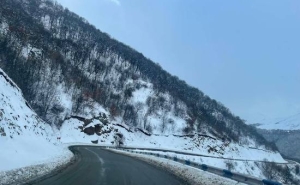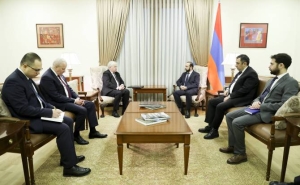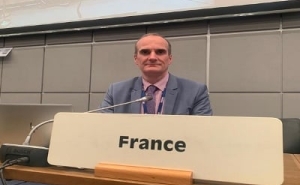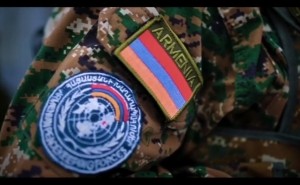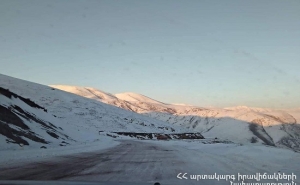 OSCE MG Co-Chairs’ Statement Signals a Range of Shortfalls
OSCE MG Co-Chairs’ Statement Signals a Range of Shortfalls
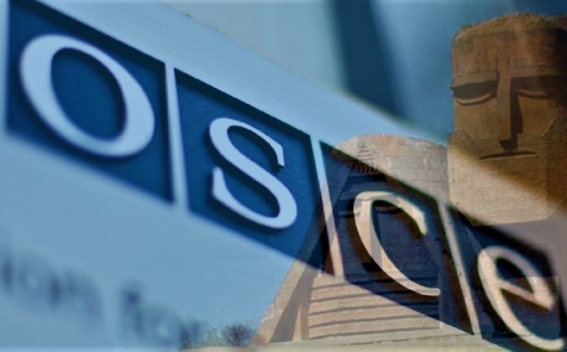
On March 9 the OSCE MG co-chairs issued a statement prior to Aliyev-Pashinyan upcoming meeting. Before we come to the content of the statement one thing should be pointed out.
Question – Why the co-chairs decided to come up with a statement on the eve of the meeting?
This could be justified if the meeting was significant for the resolution of the conflict. But the motive in this case is different. Namely it was the situation risen before the meeting, the meetings without the mediators beyond the scope of talks, a range of manipulations and statements crippling the nature and the content of the talks. The statement itself served to set the talks back on course to prevent further manipulations, to ensure constructive atmosphere as well as to not allow tricks with public mood through fake agenda.
An even more important motive is prevention of possible operations against the backdrop of Azerbaijan’s inflammatory rhetoric and military trainings without prior warnings. Given the 2016 experience the OSCE MG co-chairs will hardly limit themselves by mediator mandate in case of real war threat and fail to take steps to prevent such developments.
The Statement
Referring to the measures taken so far including the arrangements due to which the number of casualties on the border have reduced, the co-chairs seek to involve the arrangements acquired in Dushanbe by Aliyev and Pashinyan.
Alongside the necessity to defuse tension and inflammatory rhetoric is emphasized. The point is that the co-chairs, in fact, equate the desire to edit the format (regarding Armenia’s ambitions of fully involving Artsakh in the talks) with Azerbaijan’s statements on readiness of renewing active hostilities. In other terms proofreading the talks format is equated with war threat, which is unacceptable.
Moreover, with this statement the mediators are trying to prevent the change of format and stress their willingness to discuss issues as before the interested parties directly affected by the conflict, recognizing that their views and concerns must be taken into account for any negotiated solution to succeed."
Azerbaijan has taken advantage of the recent developments to directly involve the so-called “Azeri community of Karabakh" into the talks process. And such definition on part of the co-chairs can be played with the same way by Azerbaijan. So the Armenian side faces an issue to promptly take carefully drafted and consistent measures to neutralize Azerbaijan’s steps and eliminate the question from the agenda.
Another disputable definition in this context is “the preconditions being unacceptable.” In the recent ten years the rationale behind the talks process has assumed direct involvement of Artsakh in the talks after according the principles, in the agreement talks stage. Currently the Armenian authorities emphasize the urgent involvement of Artsakh. In other words the topic at question is not involving or not involving Artsakh but the time of involving. The shift of that emphasis must be well grounded both for the mediators and the international community. Otherwise that can pose risks for the Armenian sides.
Referring to the principles of regulation aimed to shed light on neutralizing a range of recent years manipulations regarding the talks nature. The mediators publicly reiterated the principles laid on the table and those underlying further regulation to exclude possible populistic statements on behalf of the sides for their domestic audiences. To be noted that principle wise there is nothing new in the statement. They also stress their integrity. The same principles were on the table in 2011 in Kazan when the sides were for the first time about to sign them.
This statement misses something else: there is no mention of previous agreements, particularly the necessity of implementation of Vienne, Sankt-Petersburg and Geneva agreements. The above mentioned agreements were reached in 2016 following the April war, as a mechanism to exclude further hostilities. Azerbaijan diligently tried to get rid of them. The agreements reached in Dushanbe and insufficient consistency on behalf of the Armenian new authorities seem to have given that chance to Baku. The result is the failure to include them in this statement.
To sum up, the inconsistent policy of the Armenian authorities in the context of Artsakh issue, particularly sometimes poorly calculated and vague statements have made Armenia’s position towards some issues intricate and uncertain for the mediators. On the other hand unacceptable is the mediators’ policy which equates not-to-be-compared actions and phenomena. That gives Azerbaijan room to maneuver, at the same time mounting the danger of resuming active hostilities.
It is high time to revalue, proofread and clarify the policy, positions and rhetoric of the Armenian sides as well as spare no efforts through all channels to strengthen our positions with the mediators.
Other materials on this subject
- Russian forces have clearly failed in their duties: senators press Biden Administration to break Azerbaijan’s blockade The United States cannot stand aside while the Aliyev regime callously threatens the lives of Nagorno-Karabakh’s citizens, and must hold Azerbaijan to account for blocking a civilian population’s access...
- US calls for the full restoration of free movement through the Lachin Corridor "We remain concerned about impeded access to the Lachin Corridor and the humanitarian implications of this situation. This sets back the peace process and undermines international confidence. We call for...
- Azerbaijani forces violate the ceasefire in Artsakh The ceasefire violation was reported to the command of the Russian peacekeeping troops.
- Azerbaijani units violate ceasefire in several directions, Artsakh’s Defense Ministry says The Armenian side has no losses. The incidents of ceasefire violations were reported to the command of the Russian peacekeeping troops.
- Russian Diplomat Reassures Armenians Over Corridor In Karabakh "The parties are in direct contact, and I assure you that the peacekeepers will not move a single centimeter until there is a new corridor," Seleznyov said.
-
 17:08
17:08The regular session of the Anti-corruption Policy Council takes place in Jermuk
-
 15:05
15:05The Prime Minister sends congratulatory messages to the supreme leader of Iran and the President of Iran
-
 11:11
11:11Armenia sends earthquake aid to Turkey
-
 10:43
10:43Commemoration of the Pontiff St. Sahak Partev
-
 09:16
09:16Some roads are closed and difficult to pass in Armenia
-
 19:55
19:55Phone conversation of the Foreign Minister of Armenia with the U.S. Assistant Secretary of State for European and Eurasian Affairs
-
 18:30
18:30Prime Minister Pashinyan and President Khachaturyan meet
-
 18:20
18:20Ararat Mirzoyan with Co-Chairman of the OSCE Minsk Group of France Brice Roquefeuil
-
 17:01
17:01Humans could land on Mars within 10 years, Musk predicts
-
 16:45
16:45France, US urge 'immediate' end to Nagorno Karabakh blockade
-
 16:01
16:01Blockaded Nagorno Karabakh launches fundraiser to support quake-hit Syria
-
 15:59
15:59Earthquake death toll in Turkey rises to 18,342
-
 15:43
15:43Ararat Mirzoyan Held a Telephone Conversation with Sergey Lavrov
-
 15:06
15:06French president rules out fighter jet supplies to Ukraine in near future
-
 14:47
14:475 Day Weather Forecast in Armenia
-
 14:44
14:44President Vahagn Khachaturyan wrote a note in the book of condolences opened in the Embassy of Syria in Armenia
-
 14:20
14:20Azerbaijan’s provocations impede establishment of peace and stability – Armenian FM tells Russian Co-Chair of OSCE MG
-
 12:57
12:57France representation to OSCE: Paris calls on Azerbaijan to restore freedom of movement through Lachin corridor
-
 11:40
11:40Command of Kosovo forces highly appreciated preparation of Armenian peacekeepers
-
 10:16
10:16The United States withdrew from sanctions against Syria for six months the provision of assistance after the earthquake
day
week
month
Humidity: %
Wind: km/h


